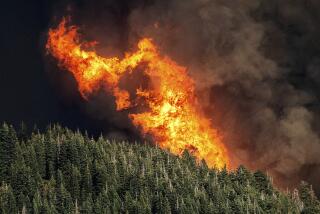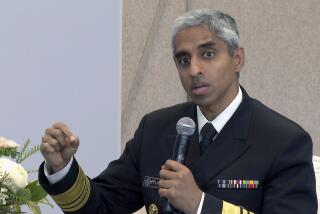Children’s Safety Neglected on Terror Front, Experts Say
- Share via
WASHINGTON — The nation is not prepared to protect and treat children in the event of a terrorist attack, child health and safety experts said Thursday as they concluded a conference in Washington.
“The possibility of large numbers of children in this country being affected by weapons of terror has not been addressed ... on state or federal or local levels in most parts of the United States,” said Dr. Irwin Redlener, president of the Children’s Health Fund, which develops health-care programs for disadvantaged children.
Redlener, who also serves on the American Academy of Pediatrics’ task force on terrorism, said disaster planning since the Sept. 11 attacks has focused primarily on the needs and requirements of adults.
“Children cannot be managed in the same way [as] adults ... for a variety of reasons that have to do with the anatomical and physiologic makeup of children,” Redlener said.
He said treatments and preventive measures that may be effective for adults could cause problems in children. For example, children require smaller doses of vaccines and antidotes, but most doses stockpiled by hospitals and the government are for adults.
Because they are shorter and therefore closer to the ground, where toxic gases would be more concentrated or particulate matter would settle, children have an increased risk of exposure to chemical or biological agents, Redlener said.
Their skin is also more porous and they breathe more rapidly than adults, meaning they could absorb more toxic material in less time, he said.
Nearly 70 experts on the effects of chemical, biological and radioactive agents on children attended the three-day conference on pediatric preparedness.
In a survey at the conference, 90% of the respondents said they were concerned about the lack of information from public health officials on the needs of children in disasters.
More than 80% agreed that more resources were needed to protect children in the event of a catastrophe.
While they did not advocate vaccinating children against smallpox as a preventive measure, the experts agreed that children should be inoculated if exposed to the virus.
After an attack, said Dr. David Markenson, director of the pediatric preparedness program at Children’s Hospital at Montefiore in New York City, the risks of smallpox far outweigh the vaccine’s side effects, which may be more potent in children, and in rare instances could be fatal.
The experts also agreed that the country should have enough child doses of potassium iodide on hand to treat children in the event of a radiation leak at a nuclear power plant.
Communities near power plants should be prepared to administer the doses to all children within two hours of exposure, they said.
While most of the recommendations focused on the roles of the government and the medical community, Markenson said parents should discuss with their children what to do, where to go and how to keep in touch in the event of an attack.
“Children have a bigger fear about what they don’t know than what they do know,” he said. “Give them concrete steps that you, the parent, have taken to make them safe and make you safe -- that’s what they want to know.”
More to Read
Sign up for Essential California
The most important California stories and recommendations in your inbox every morning.
You may occasionally receive promotional content from the Los Angeles Times.













